
Sign the petition here
Reasonable Accommodation or Flexible Work Arrangement information
| VSEA has compiled some resources to provide you with information and process for submitting a Reasonable Accommodation or Flexible Work Arrangement Request. At the end, there is a link to a form to notify your union if you did submit one of these requests, which can help us make sure that members have the resources that they need. |
| Flexible Work Arrangements As explained in the above video, Vermont’s Flexible Working Arrangements Statute requires employers, including the State, to consider requests for flexible work arrangements at least twice per year. These requests may include: • Changes to the number of days or hours worked • Adjusted arrival or departure times • Work-from-home arrangements • Job sharing • And more All employees are eligible to be considered for flexible work arrangements – including requests to work from home. Employees must make their request directly to their supervisor, clearly stating what arrangement they are seeking. The employer must then discuss the request with the employee in good faith and must consider whether the employee’s request is inconsistent with business operations. During this discussion, both sides may propose alternative arrangements. The statute does not require that the two parties reach an agreement, but once a determination has been made, the employer must notify the employee of the decision. We recommend that any request for a flexible work arrangement be made in writing, either via email or letter. To address the upcoming return-to-commute mandate, we have created a form for those seeking to gain or keep an existing work-from-home arrangement. You’ll find the link to that form below, and we encourage employees to submit these as soon as possible. |
| Reasonable Accommodations In addition to the right of every employee to be considered for a flexible work arrangement, employees with significant physical or mental conditions may be eligible for a reasonable accommodation, including potentially a work-from-home arrangement. Some employees face barriers that make it harder to get their work done, whether physical obstacles or workplace rules that pose challenges. The Americans with Disabilities Act (ADA) requires employers to provide reasonable accommodations to qualified individuals with disabilities, unless doing so would cause undue hardship to the employer. Although many individuals with disabilities can perform their jobs without accommodations, there are times when certain barriers make it necessary to modify the workplace in order to perform essential functions. Examples of reasonable accommodations include: • Installing ramps or other accessibility features for facilities • Providing reserved parking • Modifying or offering flexible work schedules • Reassigning an employee to a vacant position • Allowing remote or hybrid work arrangements • And more Employees are encouraged to watch this video, and we have provided a link below to the form you may use if you wish to request a Reasonable Accommodation. Remember that, while remote work can be a reasonable accommodation for employees with disabilities, there is also overlap with Vermont’s Flexible Work Arrangements law, described above which applies to all employees, regardless of disability status. The State of Vermont is required to consider requests for both reasonable accommodations and flexible work arrangements individually and in good faith. |
| If you submit a request and believe it was not handled properly, you may contact the Vermont Human Rights Commission (HRC) for assistance: Web: hrc.vermont.gov Email: human.rights@vermont.gov Phone: (802) 828-2480 |

Waterbury State Office Complex In-Office Day
Last week, employees who report to the Waterbury State Office Complex gathered in-person to demonstrate what Governor Scott’s December 1st Return-to-Commute mandate will truly mean for productivity, collaboration, and our office buildings.
The in-person day, organized by Health Department (VDH) staff, made it clear that there simply isn’t enough space for everyone assigned to Waterbury. The strain that this policy will place on state operations and on the dedicated public servants who make them work was made clear.
It has been 35 days since Scott announced Return to Commute and there is still no plan. In an article covering the action in VTDigger, VSEA members shared the reality that we are faced with:
“This is an attempt to show what this would be like . . . It’s going to be people on top of each other, multiple people at a desk.”
– Noah Detzer, VDH

New results from VSEA’s Return-to-Commute survey underline our concerns:
- 94% of respondents expect obstacles to returning to the office.
- 86% report being less productive when working from the office.
- 67% of respondents were women or nonbinary employees – it is clear that this mandate has a disproportionate impact on caregivers and families.
We’ll share more detailed survey results next week as we continue pressing for a better path forward.
Watch the message from VSEA’s Steve Howard
Read coverage from VTDigger: “Vermont state employees show up in person to demonstrate constraints of Waterbury office complex” by Ethan Weinstein
Governor Scott, Let us Buy You Lunch.
We invite Governor Scott to meet with us, the members of VSEA, to find an equitable approach that works for us all, to answer questions that your constituents have about this policy, and we call on him to engage in good faith.
“Together lets work to find an equitable solution. Equity by definition involves addressing individual needs and implementing policies that give every employee the resources that they need to succeed in their jobs.”
-President Bertrand
State employees feel disrespected and unheard. President Bertrand invited the Governor to meet with us, and we have yet to receive a response. This is an open and public invitation for him to meet with his constituents. We will come to him, we can meet in-person or remotely.
Governor Scott, let us buy you lunch. Let’s have a conversation.
Members can call on the Governor to accept our invitation and agree to meet with us by reaching out to him via online form or calling his office at (802)-828-3333.
-President Bertrand
Waterbury “Return to Commute” In-Office Day & Planning meeting
“State employees are everyday Vermonters. We live and pay taxes here. We volunteer and serve in our communities. We are raising our families and caring for our aging families here. We are dedicating our professional lives to serve our beautiful state.”
| All members who work at the Waterbury Complex are invited to join us in the office on 10/23. All VDH employees are invited to join the 10 am meeting in-person. |
| The in-office day is meant to show how disruptive it is for the whole Health Department and all employees at the Waterbury State Office Complex to be in person. The spaces will be loud, crowded and under-furnished because we simply do not fit. The next Vermont Department of Health (VDH) staff meeting is on Thursday, October 23rd at 10 am, and all VDH employees are invited to attend the meeting in-person. Our buildings are not going to be able to hold all of us state employees. This is a harmful “solution” in search of a problem. 4 Ways to Participate 1. Join us for the Zoom Planning meeting on Monday Organize and strategize around this action to make sure we make a big splash on 10/23. Build relationships with your colleagues. When we organize, we win. Zoom info emailed to all WSOC employees. Email vsea@vsea.org for more information if you have not received the email but wish to attend. 2. Join us in person at the Waterbury State Office Complex on 10/23. Spend the whole day in-person at WSOC to help show what it looks like for us all to be there. If you cannot be in-person the whole day, and are a member of VDH, prioritize coming for the staff meeting at 10am. Wear green, if you are able. Pack your lunch, coffee and snacks and get gas before you head to Waterbury. 3. Reserve your desk at WSOC for 10/23. Reserve a desk through the Hive desk reservation system. (There are instructions on the Hive for reserving a desk.) If no desks are available, take a screenshot of the notice and send it to returntocommute@googlegroups.com. 4. Take photos and videos! Capture what full in-person presence looks like:Crowded, loud office space,Full parking lots, andTraffic (if you can do so safely). Email them to returntocommute@googlegroups.com. If you have not done so already, sign-up to stay informed of more VDH staff actions. |
10/10/25 Update on Meeting with the Scott Administration
We have several important updates to share this week — from our recent meeting with the Governor’s administration to upcoming opportunities to take action together.
VSEA met again this week with representatives from Governor Scott’s administration regarding the Return-to-Commute (RTC) mandate. President Aimee Bertrand and VSEA Legal Counsel Al Gordon provide an update on how the meeting went in the above video.
“Lots of questions, not a lot of answers. We did ask specifically if there is a plan– we are 53 days out– to which the response is that there is not an official plan.” -President Bertrand
However, there was one glimmer of hope: anyone who submits a Reasonable Accommodation request will not be required to return to the office until their request has been reviewed and a decision has been made.
We’ll continue to push for clarity, consistency, and fairness and will keep members updated as discussions continue.
Anyone who is in a work from home status who applies for a Reasonable Accommodation now will remain in their work-from-home status at least until their request for Accomodation is ruled on. -VSEA Legal Counsel Al Gordon
Solidarity Photos
State workers across Vermont are showing up, in green and in solidarity. While Governor Scott minimizes our voices and deflects real concerns about the forced return-to-commute order, we’re standing together to demand accountability, respect, and real dialogue.
Thank you to all the state employees who wore green today a few of which are pictured below. See more on our facebook page.

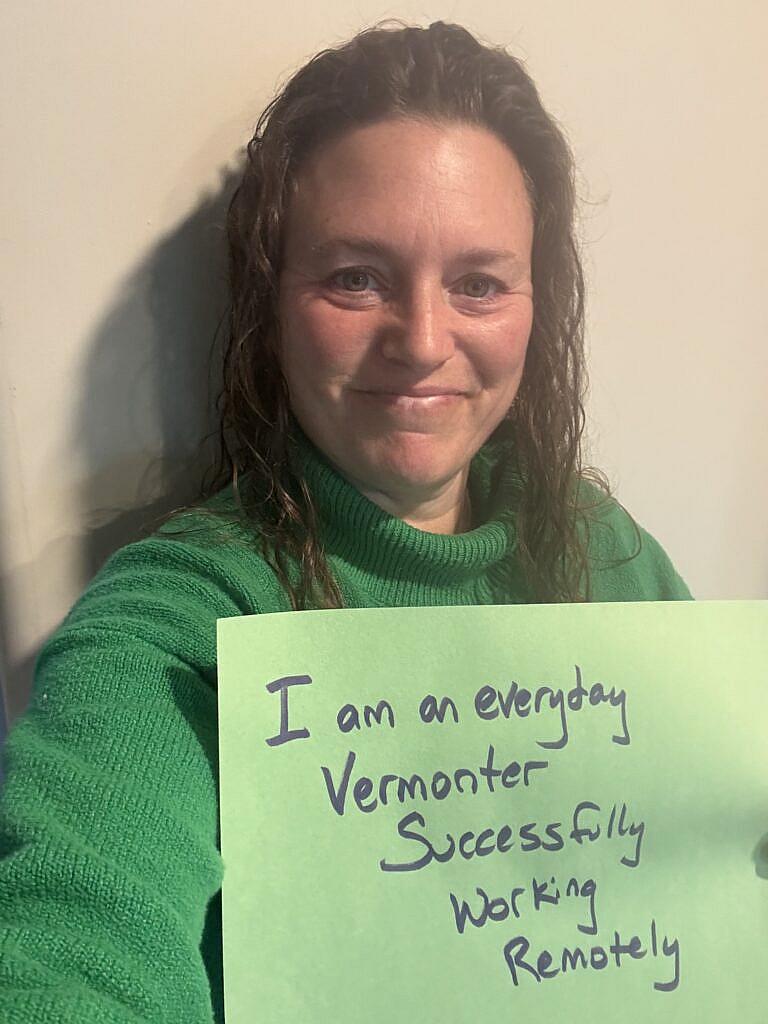
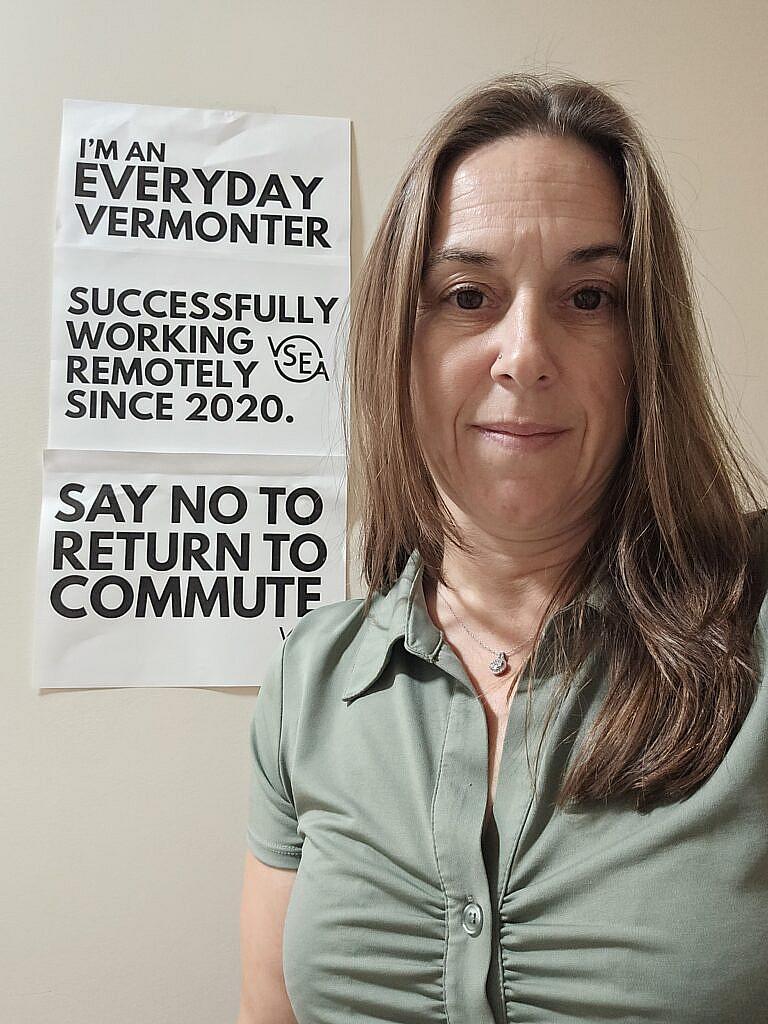
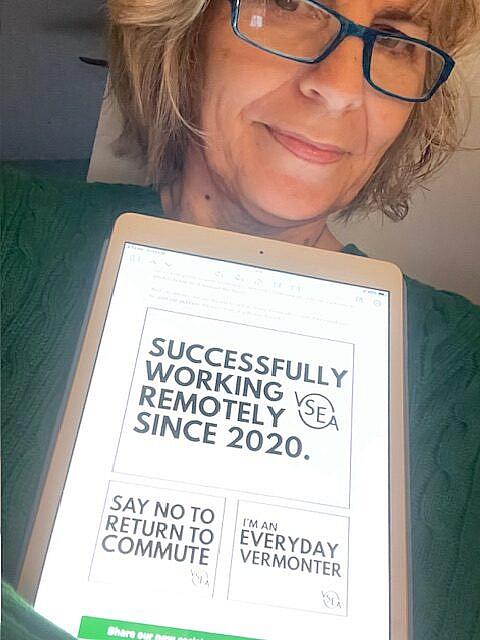

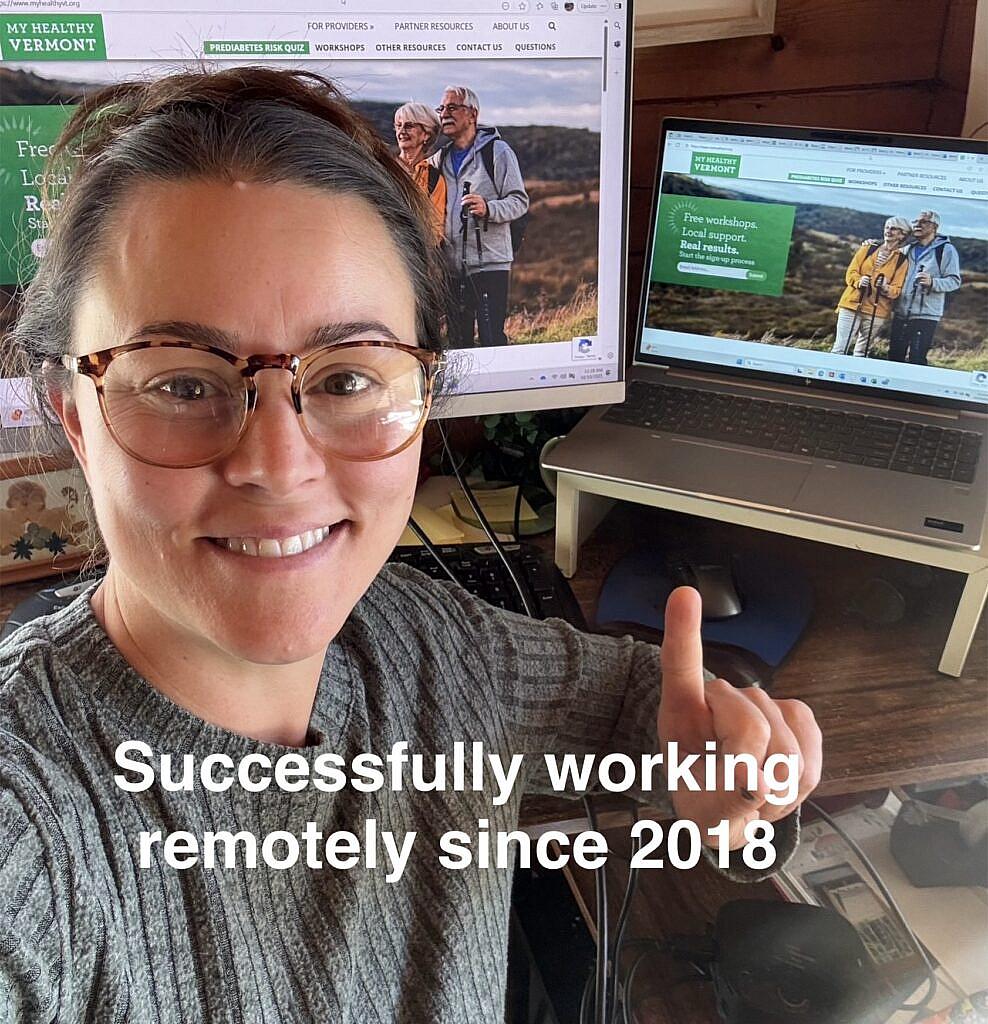

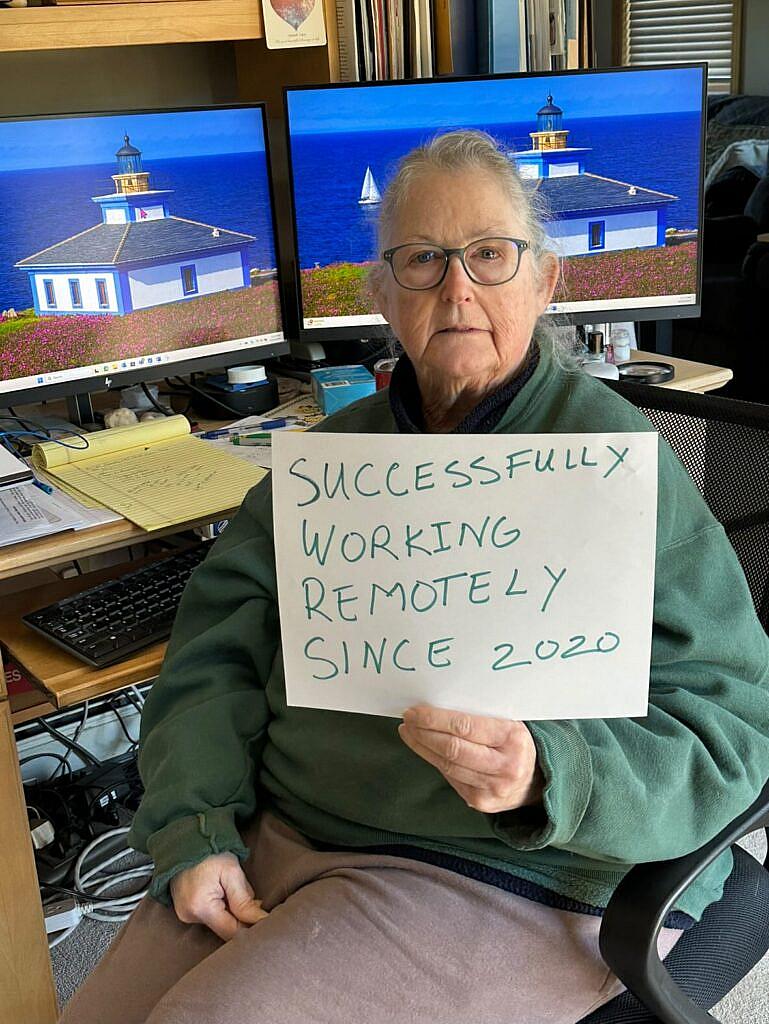
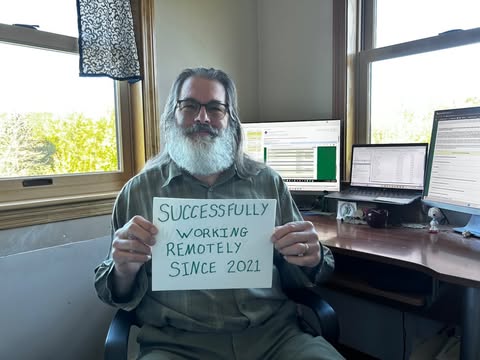
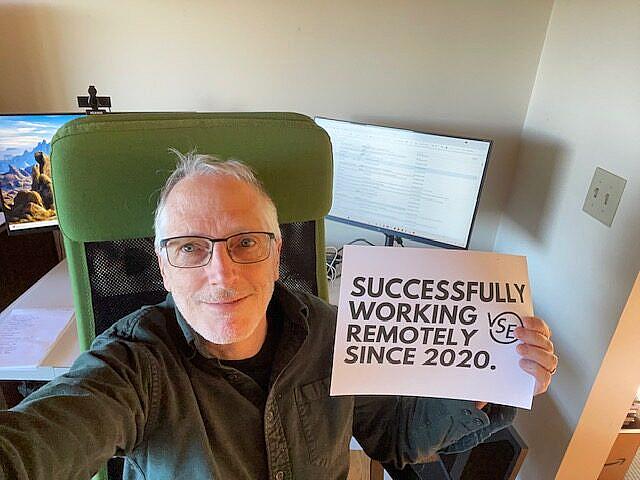
Gov. Scott on Vermont Edition
Governor Scott appeared on Vermont Edition. Instead of addressing real concerns about the return-to-commute (RTC) order, the Governor dodged questions, downplayed the struggles of state employees, and painted public servants as somehow less than “everyday Vermonters.”
“Is it easier to work remotely? Sure. I get that. But I’ve never envisioned state government as being 100% remote.”
Let’s be clear: remote and hybrid work are not about “ease.” They’re about efficiency, safety, and public service continuity. State employees proved that every day throughout the pandemic and the 2023 and 2024 floods.
The Governor also claimed that forcing employees back to the office is about “employee engagement” and “building a team,” saying,
“We are seeing many, many long time state employees leaving because they’re retiring and we need to learn from them since we need the next generation to take over. That’s difficult to do when you’re working from home and you need that connection to make it happen.”
We agree. And with almost one thousand vacancies across state government and a growing need to recruit younger workers, rigid mandates like this make Vermont less competitive, not more connected. The Scott Administration’s own Employee Engagement Survey shows that remote and hybrid work have strengthened teamwork and performance.
Over 90% of employees report they collaborate effectively remotely, and 83% say their performance improves under flexible work arrangements. If anything, this data proves that connection isn’t about proximity. It’s about trust, communication, and respect.
Governor Scott even accused Vermont Edition of encouraging state employees to call in specifically, and said that he is not hearing the same outrage about this mandate from “everyday Vermonters.” Are state employees not everyday Vermonters? It turns out that no one actually called in yesterday in support of this mandate. Governor Scott is trying to make up reasons for that, play a blame game, and flip the script.
“The union has activated their forces in trying to create this uproar and they’ve been successful in doing so.”
This is not something that we manufactured. This is democracy. This is thousands of state workers speaking out because they believe in public service and want to make Vermont’s government stronger. State employees want a seat at the table, not the Governor’s my way or the highway approach.
And when asked about workers facing displacement or homelessness from this order, he called it an “equity issue,” but offered no solutions for the people now being told to uproot their lives on short notice.
Instead of empathy, we heard excuses. Instead of leadership, we heard deflection.
Vermont Commission on Women report highlights inequities in the effects of the RTC mandate.
The Vermont Commission on Women’s recent memo confirms what we’ve seen: strict return-to-office mandates hurt employees and weaken services.
Key findings include:
- Retention risk: Women are 11% more likely to quit under strict RTO mandates compared to an 8% average drop across employees.
- Equity & safety: 88% of women report hybrid work creates a more equitable workplace, and 97% of Black employees in one national survey prefer remote or hybrid due to fewer microaggressions and harassment risks.
- Workplace culture: In Vermont’s Employee Engagement Survey, 42% of women cited hybrid schedules as a reason for staying in their jobs, compared to only 27% of men.
A message to Governor Scott: Mandatory return-to-office will hurt Vermonters.
Across the state, members are making their voices heard through our survey, and the message is loud and clear. The Governor’s push for a mandatory RTO plan will harm Vermonters and state employees alike.
“Remote flexibility has become a key factor in retaining and attracting qualified professionals. The state government should lead the way in adopting modern, forward-thinking employment practices—not step back from them.”
– VSEA Member Survey Response
“I will NOT be voting for him [Governor Scott] if RTO goes through. My family will NOT be voting for him. Our entire community will NOT be voting for him “
– VSEA Member Survey Response
“I have been working remotely for over 2 years and commuting from the Northeast Kingdom (when necessary). Being able to live in the north, while holding a state job in public service is something I value. My job can be done 100% remotely and is more efficient that way.“
– VSEA Member Survey Response
” I plan to leave this job as soon as I have a financially feasible opportunity elsewhere. I don’t want to work for an employer that has so little respect for me that they can’t provide adequate notice of such a monumental job change.”
– VSEA Member Survey Response
These aren’t just personal grievances. These are critical warnings about how this mandate will undermine public services, drive away talent, and hurt the very communities we have been hired serve.

